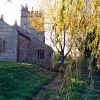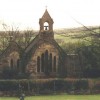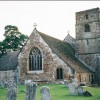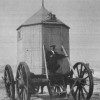In July of 1843 a severe storm brought death and destruction to the Dorset village of Marnhull. The villagers suffered thunder and lightning, accompanied by very high winds with huge hail stones raining down on them. Several men were knocked senseless by lightning and injured; John Hasket, Joseph Warren, Robert and Sara Blackmore were lying injured days after the storm and narrowly escaped the fate of one young fellow, John Fudge, who was killed outright when lightning struck them. Livestock were killed, some animals being burned alive as the hayrick they were sheltering under was struck by a bolt of lightning. The apples, plums, gooseberries, and currants were beaten off the trees; banks and walls carried away with the water, hailstones measuring three inches still remained after 24 hours.
This storm was the harbinger of worse to come though it isn’t clear how badly Dorset was damaged by the second storm that tore across the country in August, and which thundered its way from Norfolk through Cambridgeshire and on into the Midlands. Following this second storm the General Hail Insurance Company was formed, later to become Norwich Union.
In the late 18th and early 19th century it was not unusual for people to live out their lives where they were born, their history recorded in the registers of just one parish church. So it was for John Fudge the second son of Samuel and Elizabeth Fudge; he was followed into this world by another brother and five sisters. His life, though, was cruelly extinguished by the storm.
John was baptised at Marnhull on the 8th of December 1816. On the 25th of February 1837, he married a girl from the parish, Frances Abigail White. Four years older than John, she was baptised at the church on the 18th of May 1812. In their turn they took their first child Henry to be baptised on Christmas Day 1839, a duty they performed for George White, their second son, on 19th of November, 1842.
The following year proved disastrous for this small family. The Register of Burials at Marnhull records that John Fudge at the age of just 26 years was buried on the 16th of July 1843 and worse was to follow. Henry we think may have pre-deceased his father and George, while still a babe in arms, lost his mother a few weeks later; her burial was recorded on the 22nd of October 1843 with no second chance of happiness for her. Sadly there is every reason to think George didn’t survive infancy.
We know about this devastating storm from a letter sent from Marnhull on the 16th of July 1843. Written by William Lewis and addressed to his daughter Mary Ward who he asks to pass it on to her brother John: they both lived in King Street, Wimborne Minster.
Mary was married to George Ward a Tallow Chandler and Robert the son of Mary’s brother Edward was Ward’s apprentice: George and Mary had a son and a daughter. John Lewis was married and employed as a Rural Post Messenger; he was married to Sarah Masterman Fripp; the couple had three sons and three daughters.
William and Lydia Lewis, just like John Fudge, were both born and lived out their lives in Marnhull achieving their allotted three score years and ten by a distance. William, baptised on 1st of February, 1778 was the son of Thomas and Mary Lewis and Lydia, baptised on 2nd of April 1782, was the daughter of Edward and Lydia Young. William and Lydia married at Marnhull on the 22nd of February 1810 and they had four children: Edward (1810); Mary (1813); John (1815); and Elizabeth (1821). We learn from the census of 1851 that William was a Hosier and Lydia a Dressmaker. We know William was literate and the Militia List tells us he was 5’4” tall. William’s passing is recorded in the Marnull Burial Register on 10th of August 1860 and Lydia, the Register reveals, was buried five months later on 28th of December 1860.
William Lewis’s graphic description of the storm continues “…there was another wagon near where William Galpen and Edward Acouts sister-in-law was and seeing what was happening they ran and dragged them out, else they could all have been burnt to death as all of them struck senseless and some crippled.. Mr Foox was coming that way and says he never witnessed such a scene.” And he goes on to say “…your dear Mother was in the pantry on her knees praying for herself and her dear children…”



